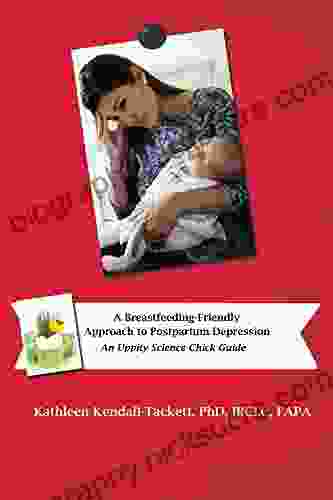Redefining Childbirth: A Comprehensive Guide to the Breastfeeding-Friendly Approach to Depression

Childbirth is a transformative experience that can bring immense joy and fulfillment, but it can also be accompanied by challenges, including postpartum depression (PPD). PPD is a common mental health condition that affects many new mothers, impacting their emotional, physical, and cognitive well-being. While traditional approaches to PPD treatment often focus on medication and therapy, there is growing evidence to suggest that breastfeeding may play a significant role in preventing and alleviating depressive symptoms.
This comprehensive article will delve into the breastfeeding-friendly approach to PPD, exploring the scientific evidence, personal experiences, and practical strategies that healthcare providers and individuals can utilize to promote optimal mental health outcomes for new mothers. By embracing a holistic approach that recognizes the intricate connection between breastfeeding and maternal well-being, we can redefine childbirth and empower women to navigate this journey with confidence and support.
5 out of 5
| Language | : | English |
| File size | : | 3543 KB |
| Text-to-Speech | : | Enabled |
| Screen Reader | : | Supported |
| Enhanced typesetting | : | Enabled |
| Word Wise | : | Enabled |
| Print length | : | 104 pages |
| Lending | : | Enabled |
The Breastfeeding-Depression Connection
The relationship between breastfeeding and depression is complex and multifaceted, with research indicating both protective and risk factors:
Protective Factors:
- Hormonal Regulation: Breastfeeding releases hormones such as oxytocin and prolactin, which have mood-boosting and calming effects.
- Reduced Stress: The act of breastfeeding can be a soothing and stress-reducing activity, providing a sense of connection and bonding between mother and child.
- Improved Sleep: Breastfeeding can help regulate sleep patterns, promoting better quality and duration of sleep, which is crucial for mental well-being.
- Enhanced Social Support: Breastfeeding often involves seeking support from healthcare providers, family, and peer groups, fostering a network of individuals who can offer emotional and practical assistance.
Risk Factors:
- Breastfeeding Difficulties: Challenges with breastfeeding, such as pain, latch issues, or insufficient milk supply, can increase stress and contribute to depressive symptoms.
- Lack of Support: Inadequate breastfeeding support from healthcare providers, partners, or society can undermine a mother's confidence and increase her vulnerability to depression.
- History of Mental Health Conditions: Women with a history of depression or anxiety may be more susceptible to PPD, regardless of breastfeeding status.
Evidence-Based Research
Numerous studies have demonstrated the protective effects of breastfeeding on PPD:
- A meta-analysis of 18 studies found that breastfeeding was associated with a 33% reduction in the risk of PPD.
- A study in the journal JAMA Psychiatry reported that women who breastfed for at least six months had a 50% lower risk of developing PPD compared to those who formula-fed.
- A longitudinal study published in the Journal of the American Medical Association found that breastfeeding duration was inversely associated with the severity of PPD symptoms.
Personal Anecdotes
Beyond scientific evidence, personal anecdotes provide compelling insights into the lived experiences of women who have benefited from the breastfeeding-friendly approach to PPD:
Sarah, a first-time mother: "Breastfeeding was a lifeline for me after the birth of my daughter. The oxytocin rush and the close bond we formed made such a difference in my mood. It helped me manage the stress and anxiety that came with being a new parent."
Emily, a mother of three: "After struggling with PPD after my first two pregnancies, I was determined to breastfeed my third child for as long as possible. The support I received from my healthcare provider and the empowering feeling of being able to nourish my baby made a world of difference in my mental health."
Practical Strategies for Healthcare Providers
Healthcare providers play a crucial role in promoting the breastfeeding-friendly approach to PPD:
- Education and Support: Educate expecting and new mothers about the potential benefits of breastfeeding for mental health and provide them with ongoing support throughout their breastfeeding journey.
- Address Challenges: Identify and address any breastfeeding difficulties promptly to prevent them from becoming sources of stress and depression.
- Encourage Support Networks: Foster connections between mothers and support groups or other resources that can provide emotional and practical assistance.
- Screen for PPD: Regularly screen all postpartum women for PPD, especially those who are exclusively breastfeeding or experiencing any breastfeeding difficulties.
- Collaborate with Mental Health Professionals: Work closely with mental health professionals to provide comprehensive care for women experiencing PPD.
Strategies for Individuals
Individuals seeking support for PPD can also benefit from the following strategies:
- Seek Professional Help: Do not hesitate to reach out to a mental health professional if you are experiencing symptoms of PPD. They can provide diagnosis, treatment, and ongoing support.
- Join Support Groups: Connect with other mothers who are breastfeeding and navigating postpartum challenges. Sharing experiences and receiving encouragement can be invaluable.
- Practice Self-Care: Prioritize your own mental and physical health by getting enough sleep, eating nutritious food, and engaging in activities that bring you joy.
- Advocate for Yourself: Do not be afraid to ask for help from healthcare providers, family, friends, or other support systems. Advocating for your needs is essential for your well-being.
The breastfeeding-friendly approach to PPD offers a transformative paradigm for postpartum care. By recognizing the profound connection between breastfeeding and maternal mental health, we can empower women to navigate childbirth with confidence and support. Healthcare providers and individuals alike have a role to play in promoting this approach, fostering a supportive environment where new mothers can thrive both physically and emotionally. Through evidence-based strategies, personal experiences, and unwavering compassion, we can redefine childbirth and create a world where every woman has the opportunity to experience the profound benefits of breastfeeding for both her child and herself.
5 out of 5
| Language | : | English |
| File size | : | 3543 KB |
| Text-to-Speech | : | Enabled |
| Screen Reader | : | Supported |
| Enhanced typesetting | : | Enabled |
| Word Wise | : | Enabled |
| Print length | : | 104 pages |
| Lending | : | Enabled |
Do you want to contribute by writing guest posts on this blog?
Please contact us and send us a resume of previous articles that you have written.
 Fiction
Fiction Non Fiction
Non Fiction Romance
Romance Mystery
Mystery Thriller
Thriller SciFi
SciFi Fantasy
Fantasy Horror
Horror Biography
Biography Selfhelp
Selfhelp Business
Business History
History Classics
Classics Poetry
Poetry Childrens
Childrens Young Adult
Young Adult Educational
Educational Cooking
Cooking Travel
Travel Lifestyle
Lifestyle Spirituality
Spirituality Health
Health Fitness
Fitness Technology
Technology Science
Science Arts
Arts Crafts
Crafts DIY
DIY Gardening
Gardening Petcare
Petcare Wanda Priday
Wanda Priday Roanne Van Voorst
Roanne Van Voorst Jaymin Eve
Jaymin Eve Mary A Fristad
Mary A Fristad Pat Shipman
Pat Shipman Harvey Wittenberg
Harvey Wittenberg Mike Swedenberg
Mike Swedenberg Marshall Jon Fisher
Marshall Jon Fisher Steven Rinella
Steven Rinella Michael Wood
Michael Wood Sampson Davis
Sampson Davis John C Norcross
John C Norcross Bobbie Faulkner
Bobbie Faulkner Alastair Hannay
Alastair Hannay Nick Bollettieri
Nick Bollettieri Diane Cardwell
Diane Cardwell Trish Kuffner
Trish Kuffner Burt L Standish
Burt L Standish Cara Koscinski
Cara Koscinski James Randi
James Randi Emma Walker
Emma Walker Jeff Alt
Jeff Alt Tara Brach
Tara Brach Denton Salle
Denton Salle Kenton Kroker
Kenton Kroker Kara Tippetts
Kara Tippetts Timothy Pakron
Timothy Pakron Stephanie Fritz
Stephanie Fritz Barzin Pakandam
Barzin Pakandam Mike Massie
Mike Massie Janis Keyser
Janis Keyser William Wasserman
William Wasserman Jennifer Estep
Jennifer Estep Dave Karczynski
Dave Karczynski Jayanti Tambe
Jayanti Tambe Leah Cullis
Leah Cullis Brian Switek
Brian Switek Isabel Fonseca
Isabel Fonseca Catherine Shainberg
Catherine Shainberg C R Hallpike
C R Hallpike T H White
T H White Barry Rabkin
Barry Rabkin Mark Kurlansky
Mark Kurlansky Matt Taddy
Matt Taddy Thomas French
Thomas French Crystal Duffy
Crystal Duffy Chris Cage
Chris Cage Fabien Clavel
Fabien Clavel William Byers
William Byers Edith Grossman
Edith Grossman Mike High
Mike High Clayton King
Clayton King Sam Harris
Sam Harris Mina Lebitz
Mina Lebitz Nadine Hays Pisani
Nadine Hays Pisani Lewis Thomas
Lewis Thomas Marco Grandis
Marco Grandis P J Agness
P J Agness Mark Mayfield
Mark Mayfield James Duthie
James Duthie Sam Nadler
Sam Nadler Valerie Pollmann R
Valerie Pollmann R Philip Maffetone
Philip Maffetone Mark H Newman
Mark H Newman Graham Farmelo
Graham Farmelo Richard J Dewhurst
Richard J Dewhurst Larry Dane Brimner
Larry Dane Brimner Nina Manning
Nina Manning Jonathan Kellerman
Jonathan Kellerman Bonnie Tsui
Bonnie Tsui Sam Kean
Sam Kean Stephen K Sanderson
Stephen K Sanderson Jack Andraka
Jack Andraka Dustin Salomon
Dustin Salomon Geoffrey Finch
Geoffrey Finch Richard Harris
Richard Harris Spencer Wells
Spencer Wells Tim Ingold
Tim Ingold Barbara Mertz
Barbara Mertz Jessica Smartt
Jessica Smartt Rob Pope
Rob Pope Julie L Spencer
Julie L Spencer Jennifer Pharr Davis
Jennifer Pharr Davis Otto Scharmer
Otto Scharmer Edward Lee
Edward Lee Bernard Marr
Bernard Marr Janna Levin
Janna Levin Mia Scotland
Mia Scotland Kyle Butler
Kyle Butler Linda Welters
Linda Welters Emma Brockes
Emma Brockes Melissa Haag
Melissa Haag Eric Franklin
Eric Franklin J C Cervantes
J C Cervantes Chris Bennett
Chris Bennett Donald Frias
Donald Frias Pearson Education
Pearson Education Nick Townsend
Nick Townsend Anthony Edwards
Anthony Edwards Master Gamer
Master Gamer Jamie Margolin
Jamie Margolin Ben Collins
Ben Collins Charlotte Booth
Charlotte Booth Helen Fisher
Helen Fisher Steve Biddulph
Steve Biddulph Julie Buxbaum
Julie Buxbaum John Quick
John Quick Wayne B Chandler
Wayne B Chandler Steve Burrows
Steve Burrows Gordon Witteveen
Gordon Witteveen James Syhabout
James Syhabout Samantha Fitts
Samantha Fitts Holger Schutkowski
Holger Schutkowski Bagele Chilisa
Bagele Chilisa Reprint Edition Kindle Edition
Reprint Edition Kindle Edition Prince Asare
Prince Asare John Whitman
John Whitman F William Lawvere
F William Lawvere Roy Porter
Roy Porter Monta Z Briant
Monta Z Briant Leslie Stager
Leslie Stager Daniel M Koretz
Daniel M Koretz Buddy Levy
Buddy Levy James M Collins
James M Collins Rob Hutchings
Rob Hutchings Eric Engle
Eric Engle John Lister Kaye
John Lister Kaye Carlo Collodi
Carlo Collodi Barbara Neiman
Barbara Neiman Susan Dennard
Susan Dennard Charles Buist
Charles Buist Charlie Shamp
Charlie Shamp Barbara Illowsk
Barbara Illowsk Elliott Vandruff
Elliott Vandruff Charles River Editors
Charles River Editors Tami Anastasia
Tami Anastasia Titus M Kennedy
Titus M Kennedy Stephen J Bavolek
Stephen J Bavolek Deanna Roy
Deanna Roy Ben Goldacre
Ben Goldacre Eric Leiser
Eric Leiser Massimo Cossu Nicola Pirina
Massimo Cossu Nicola Pirina Ben Povlow
Ben Povlow Julian I Graubart
Julian I Graubart Leon Mccarron
Leon Mccarron Rob Rains
Rob Rains Rowan Jacobsen
Rowan Jacobsen Ryan A Pedigo
Ryan A Pedigo Muhammad Zulqarnain
Muhammad Zulqarnain Bashir Hosseini Jafari
Bashir Hosseini Jafari Linnea Dunne
Linnea Dunne Lock Gareth
Lock Gareth Rachel Dash
Rachel Dash Lynn Rosen
Lynn Rosen Chiara Sparks
Chiara Sparks Barbara Bassot
Barbara Bassot Marie Rutkoski
Marie Rutkoski Gerald Beaudry
Gerald Beaudry Debbie M Schell
Debbie M Schell David Cockburn
David Cockburn Craig Lambert
Craig Lambert J Michael Veron
J Michael Veron Maha Alkurdi
Maha Alkurdi Temple West
Temple West Craig Martin
Craig Martin Jenn Mcallister
Jenn Mcallister Bill Milliken
Bill Milliken Farley Mowat
Farley Mowat Margaret Owen
Margaret Owen Chase Hill
Chase Hill Erica Schultz
Erica Schultz William H Frey
William H Frey Michael Palin
Michael Palin Thomas Bulfinch
Thomas Bulfinch Molly E Lee
Molly E Lee Robin Nixon
Robin Nixon Ron Lemaster
Ron Lemaster Ray Comfort
Ray Comfort Shmuel Peerless
Shmuel Peerless Sergei Urban
Sergei Urban Mick Conefrey
Mick Conefrey Sam Cowen
Sam Cowen Eliza Reid
Eliza Reid Malcolm Hebron
Malcolm Hebron Rachelle Zukerman
Rachelle Zukerman St Louis Post Dispatch
St Louis Post Dispatch David Abram
David Abram Grey Owl
Grey Owl Basudeb Bhatta
Basudeb Bhatta Jim Fay
Jim Fay Elizabeth Lockwood
Elizabeth Lockwood Martin Dugard
Martin Dugard Robin Mcmillan
Robin Mcmillan Ernie Morton
Ernie Morton Constanze Niedermaier
Constanze Niedermaier David Burch
David Burch Siddhartha Rao
Siddhartha Rao Cary J Griffith
Cary J Griffith Tom Miller
Tom Miller Mark Twain
Mark Twain Bb
Bb Proper Education Group
Proper Education Group Suzanne Leonhard
Suzanne Leonhard Donald R Gallo
Donald R Gallo Jim Wharton
Jim Wharton Oliver T Spedding
Oliver T Spedding Thomas Lumley
Thomas Lumley Jake Anderson
Jake Anderson Mike Loades
Mike Loades Jill Brown
Jill Brown Yang Kuang
Yang Kuang Jeremy Sweet
Jeremy Sweet V B Alekseev
V B Alekseev Rebecca Solnit
Rebecca Solnit Arnold G Nelson
Arnold G Nelson Noah Brown
Noah Brown Erica B Marcus
Erica B Marcus Richard Scott
Richard Scott Joshua G Shifrin
Joshua G Shifrin Karen Bush
Karen Bush Barry Glassner
Barry Glassner John Kimantas
John Kimantas Jeffrey Jensen Arnett
Jeffrey Jensen Arnett Kate Darling
Kate Darling Edwin R Sherman
Edwin R Sherman Joshua Hammer
Joshua Hammer Mitch Prinstein
Mitch Prinstein Dacher Keltner
Dacher Keltner Toby A H Wilkinson
Toby A H Wilkinson Randy Baker
Randy Baker Bryan Peterson
Bryan Peterson Scarlett Thomas
Scarlett Thomas Dr Craig Malkin
Dr Craig Malkin Becca Anderson
Becca Anderson Emily Chappell
Emily Chappell Joanne Glenn
Joanne Glenn Daniel T Willingham
Daniel T Willingham Paul Van Lierop
Paul Van Lierop Macauley Lord
Macauley Lord Achille Rubini
Achille Rubini Jennifer Traig
Jennifer Traig Simon Spurrier
Simon Spurrier David Aretha
David Aretha T C Edge
T C Edge Ralph Galeano
Ralph Galeano Gay Robins
Gay Robins Vincent Bossley
Vincent Bossley Ping Li
Ping Li Sport Hour
Sport Hour Mike Stanton
Mike Stanton Jessica F Shumway
Jessica F Shumway Cindy Post Senning
Cindy Post Senning David Jamieson Bolder
David Jamieson Bolder Jane Butel
Jane Butel Joseph Schmuller
Joseph Schmuller Lily Collins
Lily Collins Editors Of Southern Living Magazine
Editors Of Southern Living Magazine Sharon Dukett
Sharon Dukett Craig Romano
Craig Romano Mackenzi Lee
Mackenzi Lee Jenny Chandler
Jenny Chandler Boy Scouts Of America
Boy Scouts Of America Ronald Wheeler
Ronald Wheeler James Kilgo
James Kilgo Yuki Mano
Yuki Mano Khurshed Batliwala
Khurshed Batliwala Laura Pavlov
Laura Pavlov Benita Bensch
Benita Bensch Sara Shepard
Sara Shepard John Henry Phillips
John Henry Phillips Farzana Nayani
Farzana Nayani Charles Soule
Charles Soule Mike Allison
Mike Allison Ellen Notbohm
Ellen Notbohm David A Bogart
David A Bogart Beebe Bahrami
Beebe Bahrami Brandon Royal
Brandon Royal Daniel P Huerta
Daniel P Huerta Stanislas Dehaene
Stanislas Dehaene Rhonda Belle
Rhonda Belle Colleen Alexander Roberts
Colleen Alexander Roberts R L Medina
R L Medina Barry J Kemp
Barry J Kemp Peter Martin
Peter Martin Diane Yancey
Diane Yancey Dr Faith G Harper
Dr Faith G Harper Robin Knox Johnston
Robin Knox Johnston Autumn Carpenter
Autumn Carpenter Diane Musho Hamilton
Diane Musho Hamilton Ascencia
Ascencia Jesse Liberty
Jesse Liberty Allan V Horwitz
Allan V Horwitz Chuck Missler
Chuck Missler Brad Burns
Brad Burns Nicholas Sparks
Nicholas Sparks Steven Bell
Steven Bell Mark Young
Mark Young Stan Tekiela
Stan Tekiela John H Mcwhorter
John H Mcwhorter Ben Sedley
Ben Sedley Richard Meadows
Richard Meadows Bruce Pascoe
Bruce Pascoe Michelle Rigler
Michelle Rigler S E Hinton
S E Hinton Beau Bradbury
Beau Bradbury Justin Sirois
Justin Sirois Smart Reads
Smart Reads Arny Alberts
Arny Alberts Conor Nolan
Conor Nolan John Garrity
John Garrity Meghan L Marsac
Meghan L Marsac James C Radcliffe
James C Radcliffe Bill Mckibben
Bill Mckibben Jonathan Bergmann
Jonathan Bergmann Christine Kenneally
Christine Kenneally Marc Loy
Marc Loy John Aldridge
John Aldridge David Taylor
David Taylor Rebecca Rupp
Rebecca Rupp Suzanne Wylde
Suzanne Wylde Kit Yates
Kit Yates Tim Marshall
Tim Marshall Cynthia Levinson
Cynthia Levinson Blair Braverman
Blair Braverman John G Robertson
John G Robertson Baruch Englard
Baruch Englard Jane Hardwicke Collings
Jane Hardwicke Collings Scott Malthouse
Scott Malthouse Lew Freedman
Lew Freedman Robert Hogan
Robert Hogan Nancy E Willard
Nancy E Willard Gary Soto
Gary Soto Glenna Mageau
Glenna Mageau Scott Mactavish
Scott Mactavish Lynn Mann
Lynn Mann Clifford Herriot
Clifford Herriot Lawrence Baldassaro
Lawrence Baldassaro Hongyu Guo
Hongyu Guo Shayla Black
Shayla Black Candice Davie
Candice Davie Nicole Martin
Nicole Martin Jen Houcek
Jen Houcek John J Robinson
John J Robinson Nick Neely
Nick Neely Jeff Belanger
Jeff Belanger Barry Burd
Barry Burd Jean Smith
Jean Smith Martin Sternstein
Martin Sternstein Ryan Higa
Ryan Higa Luke Gilkerson
Luke Gilkerson Mike Commito
Mike Commito Monica Hesse
Monica Hesse Beau Miles
Beau Miles Dan R Lynch
Dan R Lynch Cait Stevenson
Cait Stevenson Babu The Panda
Babu The Panda Joanna Hunt
Joanna Hunt Leonard M Adkins
Leonard M Adkins John D Barrow
John D Barrow Sean Mcindoe
Sean Mcindoe Susan Scott
Susan Scott Jutta Schickore
Jutta Schickore Percy Boomer
Percy Boomer Chadd Vanzanten
Chadd Vanzanten Steven Hawthorne
Steven Hawthorne Eugene V Resnick
Eugene V Resnick Joseph Epes Brown
Joseph Epes Brown Peter Wacht
Peter Wacht Jay Abramson
Jay Abramson Charlotte Browne
Charlotte Browne Graham R Gibbs
Graham R Gibbs Print Replica Kindle Edition
Print Replica Kindle Edition Dustin Hansen
Dustin Hansen Vanessa Ogden Moss
Vanessa Ogden Moss Nichole Carpenter
Nichole Carpenter George Macdonald
George Macdonald Paul Doiron
Paul Doiron Fred Mitchell
Fred Mitchell Basu Shanker
Basu Shanker Cheryl Erwin
Cheryl Erwin Daniel J Barrett
Daniel J Barrett Geert Hofstede
Geert Hofstede Barbara Russell
Barbara Russell Jude Currivan
Jude Currivan Eddie Merrins
Eddie Merrins Pavla Kesslerova
Pavla Kesslerova Reelav Patel
Reelav Patel Chris Mooney
Chris Mooney David Beaupre
David Beaupre Barbara Kennard
Barbara Kennard Robert A Baruch Bush
Robert A Baruch Bush Rachel Morgan
Rachel Morgan Laura Ingalls Wilder
Laura Ingalls Wilder Kathleen Masters
Kathleen Masters Ellen Lewin
Ellen Lewin Hollis Lance Liebman
Hollis Lance Liebman Breanna Hayse
Breanna Hayse Linda Carroll
Linda Carroll Barry Rhodes
Barry Rhodes John Sandford
John Sandford Christopher Taylor Ma Lmft
Christopher Taylor Ma Lmft Kam Knight
Kam Knight Ian Leslie
Ian Leslie Gordon H Chang
Gordon H Chang Ron Avery
Ron Avery W Scott Elliot
W Scott Elliot Kenneth Wilgus Phd
Kenneth Wilgus Phd Kindle Edition
Kindle Edition Alexandra Andrews
Alexandra Andrews Bob Holtzman
Bob Holtzman Hill Gates
Hill Gates Jade Barrett
Jade Barrett Barry Johnston
Barry Johnston Daniel S Lobel Phd
Daniel S Lobel Phd Visual Arts
Visual Arts Tori Day
Tori Day Kara Goucher
Kara Goucher Jenna Helland
Jenna Helland Catherine M Cameron
Catherine M Cameron Susan Nance
Susan Nance Stefan Ecks
Stefan Ecks Shannon Reilly
Shannon Reilly Scott Westerfeld
Scott Westerfeld W Hamilton Gibson
W Hamilton Gibson Casey Watson
Casey Watson Mykel Hawke
Mykel Hawke Barbara Taylor
Barbara Taylor Melissa Gomes
Melissa Gomes Max Marchi
Max Marchi Jack Newman
Jack Newman Beth Miller
Beth Miller Brian Gilbert
Brian Gilbert Dan Golding
Dan Golding Debra Kilby
Debra Kilby Howard Zinn
Howard Zinn Jean Illsley Clarke
Jean Illsley Clarke Richard H Immerman
Richard H Immerman David Klausmeyer
David Klausmeyer David Thomas
David Thomas Scott Reed
Scott Reed S K Gupta
S K Gupta Helen Kara
Helen Kara Dr Michael P Masters
Dr Michael P Masters Richard Weissbourd
Richard Weissbourd Victor Seow
Victor Seow Joseph Alton M D
Joseph Alton M D Peter K Tyson
Peter K Tyson Mark Ellyatt
Mark Ellyatt Barbara Ann Kipfer
Barbara Ann Kipfer Barry Friedman
Barry Friedman Richard Chun
Richard Chun Chris Eberhart
Chris Eberhart Kate Williams
Kate Williams Patrick Sweeney
Patrick Sweeney Betty Stone
Betty Stone James Duggan
James Duggan Yuval Noah Harari
Yuval Noah Harari Nicholas Wolterstorff
Nicholas Wolterstorff Barbara Rogoff
Barbara Rogoff James Koeper
James Koeper Dave Rearwin
Dave Rearwin Rachel Smith
Rachel Smith Ryan T White
Ryan T White Ken Xiao
Ken Xiao J Bruce Brackenridge
J Bruce Brackenridge Bridget Flynn Walker Phd
Bridget Flynn Walker Phd Violet Moller
Violet Moller Danny Staple
Danny Staple Elizabeth George Speare
Elizabeth George Speare Christopher L Heuertz
Christopher L Heuertz Leia Stone
Leia Stone Vanessa Garbin
Vanessa Garbin Gary Lincoff
Gary Lincoff Gabriyell Sarom
Gabriyell Sarom Rick Joyner
Rick Joyner David Starbuck Smith
David Starbuck Smith Erik J Brown
Erik J Brown Hunbatz Men
Hunbatz Men Catherine J Allen
Catherine J Allen Robert Ardrey
Robert Ardrey Frederick Douglass Opie
Frederick Douglass Opie Mark Rashid
Mark Rashid Guy P Harrison
Guy P Harrison Barbara Gastel
Barbara Gastel
Light bulbAdvertise smarter! Our strategic ad space ensures maximum exposure. Reserve your spot today!

 Jerome BlairThe Story of Atlantis and the Lost Lemuria: Unraveling Ancient Civilizations...
Jerome BlairThe Story of Atlantis and the Lost Lemuria: Unraveling Ancient Civilizations...
 Darrell PowellThe Ultimate Guide to the Toddler Busy Book: A Fun and Educational Activity...
Darrell PowellThe Ultimate Guide to the Toddler Busy Book: A Fun and Educational Activity... Chase SimmonsFollow ·6.1k
Chase SimmonsFollow ·6.1k Floyd PowellFollow ·11.2k
Floyd PowellFollow ·11.2k Jared NelsonFollow ·18.4k
Jared NelsonFollow ·18.4k Tom ClancyFollow ·13.2k
Tom ClancyFollow ·13.2k Robert BrowningFollow ·2k
Robert BrowningFollow ·2k Geoffrey BlairFollow ·18k
Geoffrey BlairFollow ·18k Gary ReedFollow ·4.7k
Gary ReedFollow ·4.7k Isaac AsimovFollow ·14.5k
Isaac AsimovFollow ·14.5k

 Israel Bell
Israel BellEmbark on an Epic 160-Mile Expedition for Charity on the...
Prepare yourself for an...

 Josh Carter
Josh CarterThe Way of the Wild Goose: A Journey of Embodied Wisdom...
The Way of the Wild Goose is an ancient...

 Allen Parker
Allen ParkerMastering the Art of Bean Fly Casting: A Comprehensive...
Fly fishing,...

 Aaron Brooks
Aaron BrooksSolving the Homework Problem by Flipping the Learning
What is flipped...

 Fletcher Mitchell
Fletcher MitchellThe Jane Butel Library: A Renewed Source of Knowledge and...
The Jane Butel...
5 out of 5
| Language | : | English |
| File size | : | 3543 KB |
| Text-to-Speech | : | Enabled |
| Screen Reader | : | Supported |
| Enhanced typesetting | : | Enabled |
| Word Wise | : | Enabled |
| Print length | : | 104 pages |
| Lending | : | Enabled |










